Here, we will help you better understand why your hot water heater smells like sulfur and the repercussions of that.
Weird smells coming from our water heaters can be rather uncomfortable and make using the bathroom more of a hassle than it ought to be. However, these smells can also be telltale signs of more problematic situations that we may encounter if we don’t deal with the problem immediately.
Hot water heater smells like sulfur

The most likely reason your water heater would be giving off a sulfur smell would be because a hazardous gas known as hydrogen sulfide is traveling through your pipes and spreading through the water heater. The way hydrogen sulfide gets into the water heater itself can be any of the following.
- Too many bacteria that produce hydrogen sulfide in our water supply
No matter where you live, your water supply will have sulfate. No need to fret. Sulfate isn’t dangerous in moderate or lower amounts.
Neither is its presence weird considering that it does occur naturally. However, the problem can come from adjacent things that act with it and create more troublesome substances. [1]
Specifically, we are referring to sulfur-reducing bacteria. Sulfates are their primary source of food. When feeding on sulfates, the sulfur-reducing bacteria turn them into hydrogen sulfide. This means that the more bacteria there are, the higher hydrogen sulfide production in your water supply.
Furthermore, that same hydrogen sulfide will reach our hot water heater, leading to the awful smell and the side effects that come with it. [2]
Confirm whether you only smell the rotten egg smell when using hot water. If this is the case, your problem has been made easier.
Your hot water smelling like sulfur means that the problem is directly in the water heater. The bacteria are less problematic in this situation because you can get the solutions that’ll get rid of them quickly.
Get immediately acquainted with the problem because if the smell persists even when the cold water is on, there may be a bigger problem.
As already discussed, this means the entire water supply has a high concentration of sulfur-reducing bacteria. In this situation, you need to afford far more patience, time, and money to resolve the problem due to all the extra tests and checks that go into it.
- Corrosion of your anode rod
There is a protective rod called a sacrificial anode rod within every water heater with a tank. As the name states, this rod should take most of the damage the rest of the item would take.
The damage the rod is supposed to prevent is corrosion damage. Any corrosive materials that may threaten the composition of the tank will instead be attracted to the anode rod. Through this component, the internal workings of your water heater remain safe for far longer. However, the rod itself can become a problem. [3]
Anode rods are usually made out of magnesium or aluminum. During corrosion, particles of those materials will be let loose into the water. They may interact with the sulfates present in the water, resulting in hydrogen sulfide.
The problem here is that without the anode rod, the entire water heater may experience a shorter lifespan, but the item itself can become troublesome after a while. Therefore, it’s good to check whether the corrosion of the rod has occurred. This check is essential if you have an older water heater. [4]
- Outside sources of hydrogen sulfide
The risk to your overall household may stem from a source of hydrogen sulfide forming near our home and entering the water supply indirectly. The source may even appear due to recent disasters or weather phenomena connecting our safe water supply with a source of hydrogen sulfide.
Finding a source is paramount to resolving this type of issue with sulfur smell. Otherwise, the same problem may occur later down the line. Although you’ll know how to resolve it by that point, the issue can still take time and resources out of your daily life.
What are the side effects of hydrogen sulfide?

Although the bad smell is enough of a reason to search for a resolution of this problem, the side-effects of hydrogen sulfide within our home can become far more significant than that. Whether it’s the effect on the house itself or its inhabitants, hydrogen sulfide can result in some problematic issues.
- Effects on home
A consistent emanation of hydrogen sulfide can endanger our home in a few ways. The first and most formidable one is its ability to discolor its surroundings. Considering how troublesome the act of painting can be and its cost, we’d rather avoid the problem.
Especially damning is that this problem can happen multiple times while the hydrogen sulfide problem is ongoing, meaning that location and neutralization of the source take priority. [5]
Without proper protection, food within our home could start smelling the way hydrogen sulfide does, leading to all of our food smelling horrible. Hydrogen sulfide can ruin many dishes, rendering them inedible due to the horrible rotten egg smell they now have.
- Effects on inhabitants
Hydrogen sulfide has a very straightforward effect on the body. The gas will irritate the mucous membrane and respiratory tract, leading to many symptoms. The shorter and less focused exposure may lead to nausea, headaches, eye irritations, skin irritations, and other effects.
If contact with the substance persists, the severity of effects on our body may increase. Some severe side effects on our respiratory system may occur from constant exposure. Those who fail to fix their plumbing problem risk obtaining a much riskier health one further down the line. [6]
How to fix sulfur smell in hot water

We’ve discussed the effects and potential sources of the sulfur smell, now it’s time to discuss how to get rid of it. Whether it’s how to get rid of sulphur smell in hot water heater or the entire home and water supply, we aim to have you covered. After all, nobody likes experiencing less than perfect home conditions.
- Flush the water heater
As we’ve seen, the sulfur smell comes from hydrogen sulfide, which can lead to other side effects. As far as getting rid of it goes, you should try flushing the tank. Just about every hot water heater has a specially designed valve that can be used to flush it when necessary.
The process of flushing is something you can usually do on your own. Apart from flushing, you should drain the entire tank and stop the inlet water pipe. Otherwise, the water will flow back in and flood your bathroom.
- Call a professional
When this doesn’t end up working, you will have to resort to contacting a professional. Professionals who are experienced in dealing with hydrogen sulfide will be able to give you immediate information on the current situation. Additionally, these professionals may be capable of providing certain bits of information you would otherwise not have.
This information can allow you to figure out where hydrogen sulfide is coming from. We have covered the potential sources as well as potential areas where they may accumulate in. But, of course, a trained professional will do much better in locating those sources than us.
Another thing they will be able to do is to detect a corroded anode rod. When an anode rod starts deteriorating, a professional can both note the issue and replace the entire rod. This will prevent problematic chemical reactions from happening.
Hot water heater smells like sulfur
Assuming the hydrogen sulfide is coming from a certain source, we should strive to get rid of it as soon as possible. While it may sound logical, it’s not that rare to see people ignore a problem like this. Even if people have found the source of their troubles, the act of getting rid of it usually takes far longer due to their unwillingness to proceed with the solution.
New hot water heater smells like sulfur
Even if it’s an entirely new water heater, it may not be immune to the stench of sulfur. The water supply is most likely the conspirator if your new hot water heater smells like sulfur. After all, the hydrogen sulfide wouldn’t have enough time to accumulate within the tank beforehand if it’s new.
If this problem didn’t occur with the old water heater, the issue might still be with the water supply. After all, the water supply can be a source of many weird issues. The key part about keeping ourselves safe is remembering that the conditions and health of our entire home can heavily fluctuate within a very short timeframe. It’s no different with the quality of our water supply.
While some may find themselves in an unfortunate situation where their water supply comes from a water source that is inherently infested with sulfate-reducing bacteria, others may have only recently experienced this. The higher their concentration, the higher the chance electric hot water heater smells like sulfur in our home.
Conclusion
The smell of rotten eggs is uniquely tied to hydrogen sulfide. This gas occurs when certain bacteria feed on sulfate and produce this gas as a side effect. So the problems will be easy to spot even past the familiar smell of rotten eggs. What comes into practice then are multiple ways to get rid of it.
Knowing how easy and frequent the problems with hydrogen sulfide can be is essential to keeping an eye out for this issue. Whether it’s a new or old water heater, the horrible smell may still invade your home.
Regardless of the source of this problem, we recommend dealing with it soon. The health issues and household damages that this gas can induce can become rather severe if too much time passes.

Michael Davis is a heating & plumbing expert who currently works as independent contractor in SC. He also writes for Plumbertip.
For almost 10 years he worked on various plumbing tasks across South Carolina.



